Nur 631 topic 16 Study guides, Class notes & Summaries
Looking for the best study guides, study notes and summaries about Nur 631 topic 16? On this page you'll find 44 study documents about Nur 631 topic 16.
Page 4 out of 44 results
Sort by
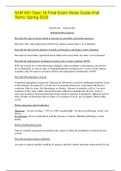
-
NUR 631 Topic 16 Final Exam Study Guide (Fall Term): Spring 2020 WITH CORRECT ANSWERS
- Study guide • 15 pages • 2020
-
- $12.49
- + learn more
Definitions/Descriptions Question: Describe the type of lesions found in psoriasis & seborrheic and actinic keratosis. Question: Describe the skin lesions found in Varicella (chickenpox) and herpes zoster (shingles). Question: Describe the pathogenetic mechanism of polycystic ovarian syndrome (POS). Question: Describe Hirschsprung’s disease. Question: Define marasmus and kwashiorkor. Question: Define deafferentation pain. Question: Describe myofascial pain syndrome. Question: Describe neuropa...
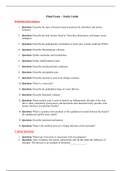
-
NUR 631 Topic 16 Final Exam Study Guide: Session 2020.
- Study guide • 4 pages • 2020
-
- $14.98
- + learn more
NUR 631 Topic 16 Final Exam Study Guide: Session 2020 1. Question: Describe the type of lesions found in psoriasis & seborrheic and actinic keratosis. 2. Question: Describe the skin lesions found in Varicella (chickenpox) and herpes zoster (shingles). 3. Question: Describe the pathogenetic mechanism of polycystic ovarian syndrome (POS). 4. Question: Describe Hirschsprung’s disease. 5. Question: Define marasmus and kwashiorkor. 6. Question: Define deafferentation pain. 7. Question: Describe myo...
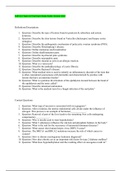
-
NUR 631 Topic 16 Final Exam Study Guide: Session 2020
- Study guide • 4 pages • 2020
-
- $14.49
- + learn more
NUR 631 Topic 16 Final Exam Study Guide: Session 2020 1. Question: Describe the type of lesions found in psoriasis & seborrheic and actinic keratosis. 2. Question: Describe the skin lesions found in Varicella (chickenpox) and herpes zoster (shingles). 3. Question: Describe the pathogenetic mechanism of polycystic ovarian syndrome (POS). 4. Question: Describe Hirschsprung’s disease. 5. Question: Define marasmus and kwashiorkor. 6. Question: Define deafferentation pain. 7. Question: Describe my...
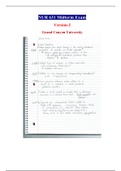
-
NUR 631 Topic 8 Midterm - version2
- Exam (elaborations) • 11 pages • 2020
- Available in package deal
-
- $24.99
- + learn more
NUR 631 Topic 8 Midterm - version2 ----------- 1.Question: What causes the rapid change in the resting membrane potential to initiate an action potential? 2.Question: What type of necrosis is often associated with pulmonary tuberculosis? 3.Question: What is an example of compensatory hyperplasia? 4.Question: Law plasma albumin causes edema as a result of a reduction in which pressure plasma oncotic: 5.Question: When a child inherits a disease that is autosomal recessive, it is inherited from who...

-
NUR 631 Topic 16 Final Exam Chart (Summer Session) -Grand Canyon University
- Exam (elaborations) • 38 pages • 2020
- Available in package deal
-
- $22.98
- + learn more
NUR 631 Topic 16 Final Exam Chart-Grand Canyon University/NUR 631 Topic 16 Final Exam Chart-Grand Canyon University/NUR 631 Topic 16 Final Exam Chart-Grand Canyon University Angina Pectoris Myocardial Infarction Pancreatitis Cholecystitis Appendicitis Peritonitis Nephrolithiasis Ovarian Cysts Gout Osteoarthritis Osteoporosis Rheumatoid Arthritis Sciatica Osetomyelitis Cellulitis ADH Aldosterone ANP BNP Hyponatremia Hypernatremia Diabetes Insipidus SIADH Potassium (3.5-5.0)/ ECF, Hypokalemia <...
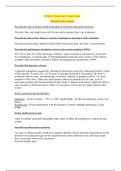
-
NUR 631 Topic 16 Final Exam Study Guide (Fall Session)- Questions and Answers
- Study guide • 14 pages • 2020
- Available in package deal
-
- $25.98
- + learn more
NUR 631 Topic 16 Final Exam Study Guide (Fall Session)- Questions and Answers/NUR 631 Topic 16 Final Exam Study Guide (Fall Session)- Questions and Answers Definitions/Descriptions Question: Describe the type of lesions found in psoriasis & seborrheic and actinic keratosis. Question: Describe the skin lesions found in Varicella (chickenpox) and herpes zoster (shingles). Question: Describe the pathogenetic mechanism of polycystic ovarian syndrome (POS). Question: Describe Hirschsprung’s diseas...
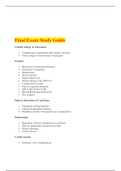
-
NUR 631 Topic 16 Final Exam Study Guide (Spring Session)-Questions and Answers
- Exam (elaborations) • 4 pages • 2020
- Available in package deal
-
- $12.98
- + learn more
NUR 631 Topic 16 Final Exam Study Guide (Spring Session)-Questions and Answers/NUR 631 Topic 16 Final Exam Study Guide (Spring Session)-Questions and Answers/NUR 631 Topic 16 Final Exam Study Guide (Spring Session)-Questions and Answers Cellular biology and Alterations Genetics Fluid and Electrolytes and Acid-base Pulmonology Cardiovascular Endocrinology Neurology Gastroenterology Nephrology Urology Musculoskeletal Integumentary Oncology Hematology Infection Reproductive

-
NUR 631 Topic 16 Final Exam Chart;Complete Chart
- Other • 38 pages • 2020
-
- $20.98
- + learn more
(NUR 631 Final Exam Chart) Disease S/S Links Testing Treatment Angina Pectoris Myocardial Infarction Pancreatitis Cholecystitis Appendicitis Peritonitis Nephrolithiasis Ovarian Cysts Gout Osteoarthritis Osteoporosis Rheumatoid Arthritis Sciatica Osetomyelitis Cellulitis ADH Aldosterone ANP BNP Hyponatremia Hypernatremia Diabetes Insipidus SIADH Potassium (3.5-5.0)/ ECF, Hypokalemia <3.5 Hyperkalemia >5.5 Bicarb (HCO-3) (24-28) CO2 (35-45) pH <7.4=acidic >7.4= akaline Anemia __ of ac...
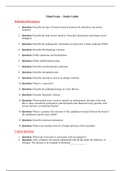
-
NUR 631 Final Exam Study Guide - Questions but no answer. See How Well You're Prepared
- Study guide • 4 pages • 2020
-
- $14.79
- + learn more
NUR 631 Topic 16 Final Exam Study Guide: Session 2020 1. Question: Describe the type of lesions found in psoriasis & seborrheic and actinic keratosis. 2. Question: Describe the skin lesions found in Varicella (chickenpox) and herpes zoster (shingles). 3. Question: Describe the pathogenetic mechanism of polycystic ovarian syndrome (POS). 4. Question: Describe Hirschsprung’s disease. 5. Question: Define marasmus and kwashiorkor. 6. Question: Define deafferentation pain. 7. Question: Describe myo...
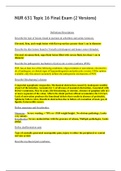
-
NUR 631 Topic 16 Final Exam (2 Versions)/Advanced Physiology And Pathophysiology: Complete Solution Rated A
- Exam (elaborations) • 14 pages • 2020
-
- $20.99
- + learn more
Question: Describe the type of lesions found in psoriasis & seborrheic and actinic keratosis. Question: Describe the skin lesions found in Varicella (chickenpox) and herpes zoster (shingles). Question: Describe the pathogenetic mechanism of polycystic ovarian syndrome (POS). Question: Describe Hirschsprung’s disease. Question: Define marasmus and kwashiorkor. Question: Define deafferentation pain. Question: Describe myofascial pain syndrome. Question: Describe neuropathic pain. Question: Descr...

That summary you just bought made someone very happy. Also get paid weekly? Sell your study resources on Stuvia! Discover all about earning on Stuvia


